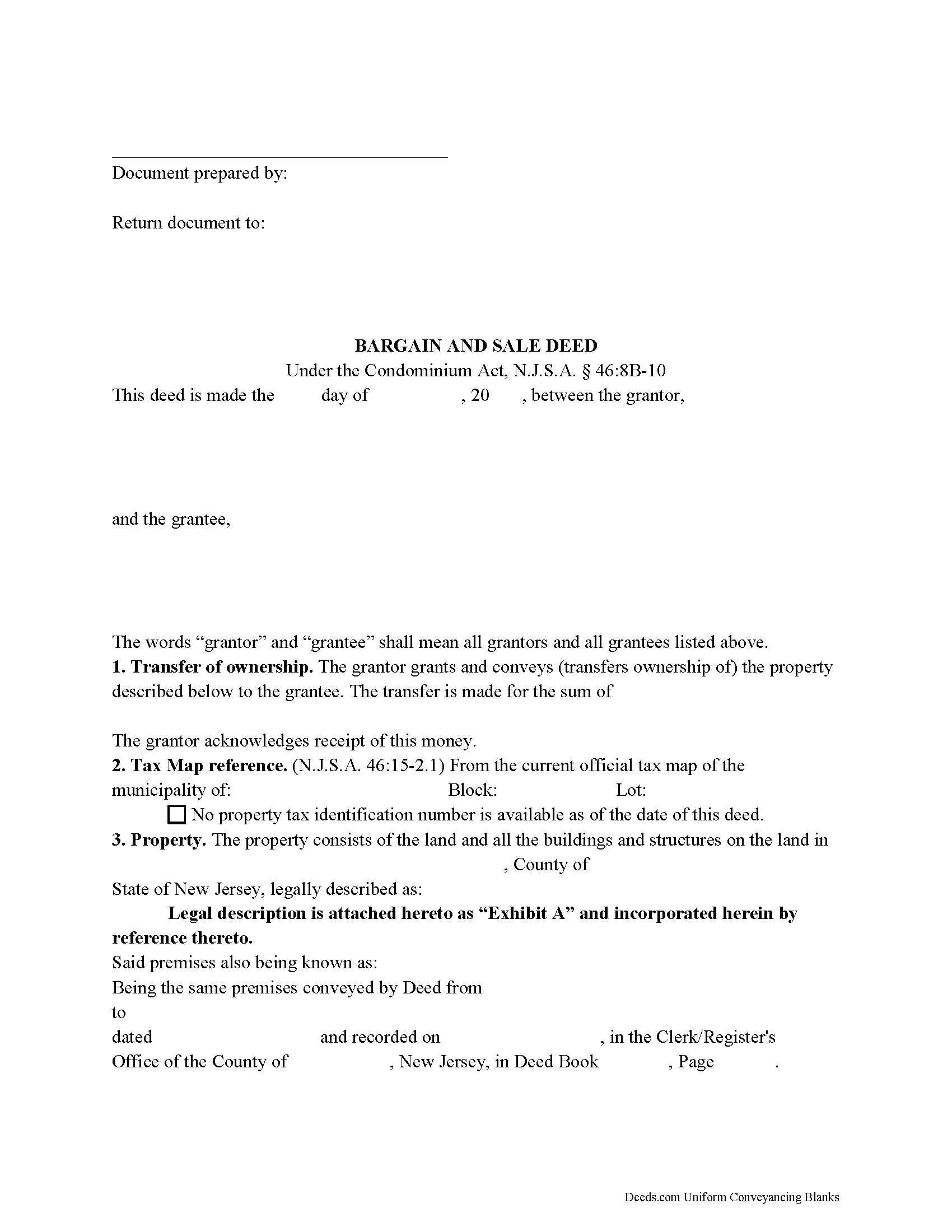Download New Jersey Bargain and Sale Deed Condominium Legal Forms

New Jersey Bargain and Sale Deed Condominium Overview

New Jersey's Condominium Act is codified under 46:8B of the New Jersey Statutes.
A condominium is a form of ownership, established by a master deed, "providing for ownership by one or more owners" in units, together with an undivided interest in the common elements appurtenant to each unit (N.J.S.A. 46:8B-3(h)). Common elements are those described in the master deed, which are "necessary or convenient to the existence, management, operation, maintenance and safety of the condominium property or normally in common use," such as hallways, lobbies, stairways, elevators, central utilities, gardens, or any such improvement intended for common use (46:8B-3(d)).
Units are part of a condominium property intended for independent use, having a direct exit to a public street or way or to a common element or common elements leading to a public street or way, together with their proportionate undivided interest in the common elements (46:8B-3(o)). Unit owners hold title to units in fee simple (46:8B-3(q)).
A unit deed is a conveyance of a unit in recordable form (46:8B-3(p)). The content requirements are established at N.J.S.A. 46:8B-10. All unit deeds require the name of the condominium as it appears in the master deed; the subdivision and county, with reference to book, page, and recording office where the master deed is on record; the unit designation as it appears in the master deed; a reference to the last prior unit deed conveying the unit, if the unit has been previously conveyed; and, finally, must reflect the proportionate undivided interest in the common elements appurtenant to the unit, as set forth in the master deed and any amendments to it. Appurtenances are rights which are attached to the unit and pass with the unit upon its sale, and to which one or more unit owners have an exclusive use, such as a balcony attached to the unit, a parking space, a storage unit, etc.
The most common form of conveyance in New Jersey is a bargain and sale deed with a covenant as to grantor's acts (46:4-6). The instrument may appear in the short form for a deed, codified at 46:4-1. By including the words, "that he has done no act to encumber the said lands," the grantor covenants that he has not done or executed any act or deed to change, charge, alter, affect, defeat, or encumber the title to the property.
The deed identifies the grantor's (selling party) information; grantee's (buying party) information, including how the grantee intends to hold title to the property; the consideration made for the transfer; and the parcel's tax map reference under 46:15-2.1.
The legal description for a unit deed contains specific information pertaining to the unit, the condominium, the appurtenances attached to the unit, and recording information for the master deed, including any amendments made to it.
Pursuant to 46:15-6(a), the deed requires a statement of the true consideration for the transfer, either in the body of the deed, the acknowledgment, the proof of the execution, or an appended affidavit by one of the parties to the deed, or the party's legal representative. Deeds exempt from the transfer fee imposed by 46:15-7 require an affidavit stating the basis for the exemption (46:15-6(b)).
Apart from meeting content requirements, the deed must conform to statutory and local formatting standards for recording.
Deeds must be signed by each grantor and acknowledged or proved as provided by Title 46 of the New Jersey Statutes. Property owned by a married person requires the spouse's signature because of potential marital rights, regardless of whether the spouse holds a direct interest in the property.
Record the deed in the clerk/recorder's office of the county where the real property is situated. Recorded deeds provide notice to subsequent purchasers (46:26A-12(a)). Include any required supplemental documentation with the deed (documentary summary sheet, relevant affidavits, certificates, etc.), along with transfer and recording fees. Deeds pertaining to an interest in real property to which an age restriction applies must be accompanied by the required certificate pursuant to 46:15-6.2.
This article is intended for general informational purposes only and does not address specific situations or replace legal advice. Consult a lawyer with questions about unit deeds, bargain and sale deeds, and transfers of real estate in New Jersey.
(New Jersey BSDC Package includes form, guidelines, and completed example)